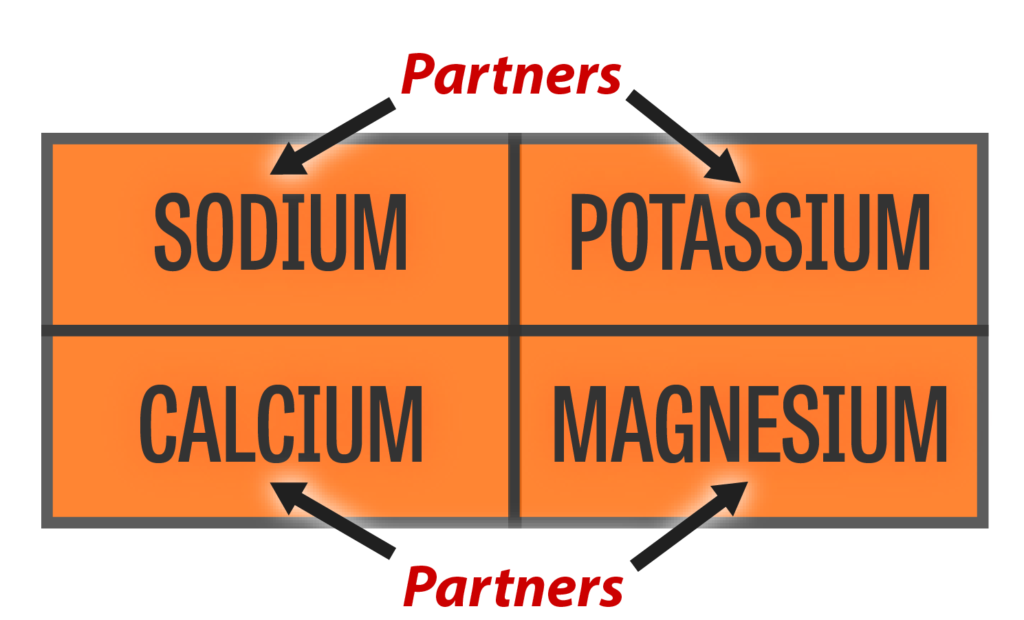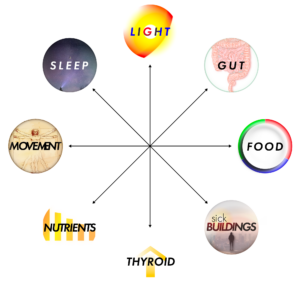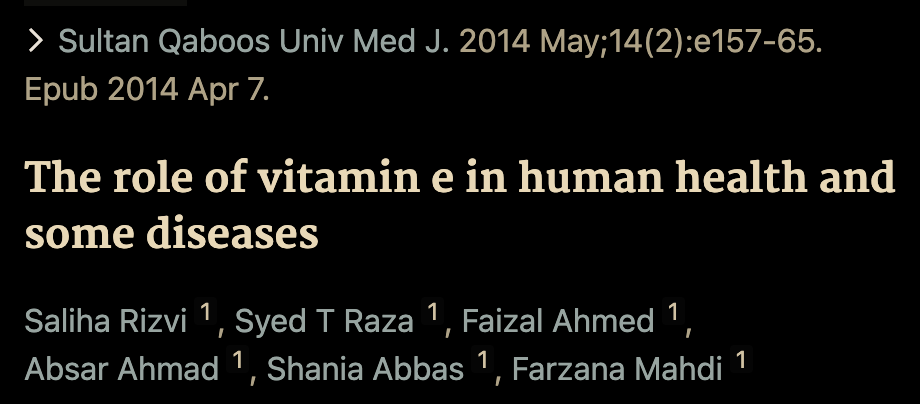Most of us are deficient in some nutrients — even healthy people!
As we’ll explore, food isn’t as nutritious as it used to be. And supplements don’t automatically cover the gaps.
Illnesses make us even more deficient — through low-grade inflammation in the gut and blood stream.
And some of us are oversupplementing, causing problems with excessive nutrition. Too much of certain nutrients will only deplete others. Excess causes imbalance in the body, too!
There is no thorough, complete scientific consensus about how nutrients should be balanced in the body.
For starters, testing for nutrient status has its challenges. Labs aren’t always accurate, at least not for all nutrients (or even most).
There’s also the challenge that no two bodily environments are the same. Inflammation, a weak gut microbiome, poor sleep, or hypothyroidism — all can cause the body to absorb, balance, and waste nutrients — differently from person to person.
Here’s an example of how tricky things can get if we let them: sun exposure can raise Vitamin D (at the right time of year & day), but almost always will deplete Vitamin A a little. Not a problem, though, unless you’re already deficient in A.
And anything that can induce chronic inflammation — from poor sleep to a moldy house or weak gut health — can lead to blunted absorption and utilization of nutrients.
Toxicity causes inflammation. Pathogens cause inflammation. Poor sleep causes inflammation. Aging, too, causes chronic inflammation.

And with chronic inflammation comes blunted nutrient absorption. If you’ve got high inflammation, you’re probably not getting nutrients as easily as you should.
Which means: You might want to do something (smart) about that.
As we said earlier, this can be an incredibly complicated topic, and one without much scientific consensus.
But for me — and the clients I work with — incredible benefits are available when we know how to come up with a safe and effective nutrient regimen.
I’ve seen blood sugar stabilize — in both the severe diabetic and in hypoglycemia — with simple changes to nutrition. I’ve seen insomnia reverse — and not come back. I’ve seen energy levels restored. Gut health improve. Thyroid function normalize. Cognition sharpen.
You name it, in 15 years, I’ve seen that symptom improve via nutritional balancing.
But it’s not all peaches and cream. If we upset our nutritional balance — and that’s easy to do in chronic illness and aging via unwise supplement use — we can cause some pretty big challenges.
If there was ever a time to be smart, this might be the time — when attempting to bring nutritional balance to the body.
Three Important Questions
“The presence of a certain amount of one nutrient often increases or decreases the amount of other nutrients needed.”
Ray Peat, PhD
For nutrients to be swiftly absorbed into cells for energy, quite a few things must happen:
These processes allow the body to maintain homeostasis — balance.
The Body Needs Balanced Fluids
The body is mostly water!
Fluids are naturally and easily balanced — by a healthy body.
In poor health, though, we see signs of poor fluid balance: puffiness, dehydration, cramps, and edema.
The gut is a primary controller of fluid balance throughout the body. It protects the liver and kidneys from being overworked. It protects the immune system from being overwhelmed. And it absorbs the vital nutrition required to power the whole system!
When gut health is weakened, the net result is simple: inflammation rises, fewer nutrients are absorbed, and toxicity builds up.
But when gut health is solid, nutrients are absorbed easily! Metabolic waste and toxins are removed swiftly!
The body stays balanced, in good health.
In a healthy body, nutrients are properly absorbed in the gut, then delivered to cells, where they stay balanced throughout the body.
Perhaps you’ve been diagnosed with hypothyroidism, or recently seen your sleep or digestion plummet. In chronic illness & aging, the system struggles to maintain its nutritional balance.
In hypothyroidism, the body often struggles to retain sodium. You might find yourself needing extra sodium at each meal to maintain bodily warmth, to sleep, and to keep the gut motile.
With poor gut health, healthy probiotics are not present to create the B-vitamins, or butyric acid (a healthy nutrient-like fatty acid).
Nutritional Immunity
Infections can cause the body to “sequester” its nutrients. This means pathogens can’t get the nutrients — but neither can your body.
The body fights infections by many avenues. One such process is known as nutritional immunity, where the intestines slow nutrient uptake and nutrients in the bloodstream are “hidden” from pathogens.
This can weaken a pathogen and slow an infection — but also makes nutrients unavailable for use by the body.
Nutritional immunity is beneficial in acute infections, but it is detrimental and counterproductive when illnesses become chronic (such as gut microbiome issues, hypothyroidism, or co-infections).
Ultimately, the body is forced to fend off long-standing infections in a state of perpetual nutrient deficiency — which is hardly a winning battle.
Hypothyroidism appears to be deeply connected to nutritional immunity: the body’s metabolism even slows down to preserve vital nutrients.
Pernicious nutrient deficiencies are a common occurrence in the chronically ill.
Quotes About Nutritional Immunity
“While sequestering zinc is considered a protective response to restrict pathogens, the resulting decline in serum zinc levels may compromise the immune cell functions resulting in adverse effect.”
https://www.ncbi.nlm.nih.gov/pmc/articles/PMC6340979/
“Nutritional problems in chronic disease are a significant cause of increased morbidity, mortality, and psychosocial consequences of growth failure.”
https://www.ncbi.nlm.nih.gov/pmc/articles/PMC6340979/
Poor gut health — with its inflammation and nutritional immunity — perpetuates chronic illness by reducing the absorption of nutrients from the gut. Inflammation takes it a step further, and blocks nutrients from entering cells.
Nutrient deficiencies ultimately lead to more compound problems than the initial infection or disease state — chronic illness.
“In this process, intestinal assimilation of minerals is reduced, and free minerals are sequestered in storage tissues, primarily the liver, thereby rapidly limiting the circulating minerals available for uptake and use by pathogens.”
https://www.ncbi.nlm.nih.gov/pmc/articles/PMC6124953/
Nutritional Deficiencies Cause Deeper Problems Downstream
Nutrient deficiency, unfortunately, compromises immunity even further.
Thus, the body’s pathogenic load can increase — whether it be chronic viral infections like Epstein-Barr, or bacteria like Lyme. Remember, the gut microbiome is loaded with microbes! Weaker immunity means the scales will be tilted away from healthful balance in the gut — and that affects the entire body.
Why does a higher pathogenic load matter? More pathogens means rising systemic inflammation and rising endotoxicity. Both impair the liver and gut, and often blunt the metabolism.
When the body is chronically ill, many factors work together to cause nutrients to become scarce.
Inflammation Disrupts Nutrition
On top of hiding nutrients from pathogens, chronic inflammation further stops nutrients from entering cells — and from being absorbed in the gut.
This can even induce energetic deficiencies — where the body can’t get enough calories from food, regardless of intake.
“Mere increased inflammatory burden can increase the caloric need and, thereby, the risk of protein-calorie malnutrition.”
https://pedsinreview.aappublications.org/content/21/1/29
What’s worse, pathogens, particularly in the gut, release toxins known as “endotoxin” which are quite harmful and readily absorb into the bloodstream.
In poor gut health, normal metabolic waste is not cleared very well.
Poor gut health means daily toxicity builds up in the gut and is reabsorbed into the bloodstream and transported throughout the body. This overwhelms every bodily system — which cannot function optimally in a state of high toxicity — and inflammation rises high.
Chronic toxicity — and inflammation, itself — burdens the liver and kidneys. Which is a problem: Liver/kidney function is vital for balance within the body.
(This situation can be compounded further in genetic situations like MTHFR — where detoxification in the body is effectively slowed down.)
Rapid Use & Loss Of Nutrients
In hypothyroidism, minerals are wasted rapidly.
As the metabolism slows, the body can’t retain minerals in cells (because doing so requires energy), and they are lost via urine.
A healthy body doesn’t waste nutrients this way, but an unhealthy body can — and it’s a big deal. Rapidly losing nutrients wrecks energy metabolism in the short term, and worsens health outcomes in the long-term.
All of these effects accumulate in the system in a chronic feedback loop. The body needs nutrients more than ever — yet fewer and fewer nutrients are absorbed and available to the body.
“Based on the nutrients in short or excess supply, imbalances create unpleasant side effects and conditions that could lead to serious disease.”
https://obesity-diet.nutritionalconference.com/events-list/nutritional-imbalance

Unfortunately, soil quality is plummeting, and modern farming practices are the reason.
Poor soil means food is less nutritious.
Perhaps unsurprisingly, few diets — on their own — provide adequate nutrition.
In a 2010 study, researchers found that most popular diet plans were remarkably deficient in micronutrients.

“These selected diet plans are presented to the public as sound, healthy, balanced diets.
https://www.ncbi.nlm.nih.gov/pmc/articles/PMC2905334/
They recommend their followers eat a variety of fresh fruits and vegetables, whole grains and lean proteins, and yet, not a single plan was able to provide RDI sufficiency of the studies selected 27 essential micronutrients at the calorie intake level suggested by their respective sample menus.
It was found that 100% sufficiency was possible for all 27 essential micronutrients only when daily calorie intake requirement averaged 27,575 calories.”
An individual following a popular diet plan using food alone, has a high likelihood of becoming micronutrient deficient, a condition shown to be scientifically linked to a higher risk of dangerous and debilitating diseases including cancer, osteoporosis, heart disease, birth defects and overweight/obesity.
https://www.ncbi.nlm.nih.gov/pmc/articles/PMC2905334/
Plummeting soil quality and diet research both suggest that it’s difficult to receive adequate nutrition from food alone.
No nutrient acts alone in the body. Ever! All nutrients work together to facilitate the work of the body.
Among the micronutrients, each exists within a family of other nutrients, and balance is essential within — and across — these families.
Thinking even deeper, to some extent, every nutrient is a cofactor for every other nutrient.
All nutrients interact with each other. On some basic level, every nutrient is a “weak co-factor” with all others to help the metabolism turn food into energy.

But some nutrient relationships are especially important, and the term cofactor typically refers to these special relationships between nutrients.
Each nutrient has a small handful of other nutrients that are considered its (main) cofactors.
Supplementing one nutrient without its cofactors, or in optimal ratios, can directly result in imbalance over time.
Example Co-Factors:
Vitamin D
- Magnesium
- Vitamin A
- Vitamin K2
Sodium
- Potassium
- Magnesium
- Vitamin C

Partner Nutrients
But it goes deeper than just co-factors. Most nutrients have a single most important cofactor. This might be considered its ‘partner’ nutrient.
Partner nutrients must be well-balanced with each other in the body.
Here’s a really big point: Any supplementation of one nutrient will — theoretically — “use up” or “drive down” or deplete its partner’s levels
This depletion happens with virtually all co-factors — but with partners it’s perhaps 10X more powerful of a relationship.
Partners often exist in the body in a 1:1 relationship — like sodium and potassium or calcium and magnesium — but not always: zinc and copper have a 10:1 ideal ratio.
Examples of Major Partners:
Congratulations! You’ve completed Why Nutrients?
Few things have been as rewarding as successful nutrient balancing.
But few things can be as frustrating, too — especially if you don’t know what you’re doing, or feel lost.
The basics of nutrient balancing are fairly straightforward: a gentle, balanced multivitamin is often a great place to start.
Most people need more potassium — and will feel much better taking some supplementally. But if you’ve got hypothyroidism, there’s a chance you’ll need potassium’s partner: sodium, instead, and maybe in quite large amounts. (Remember the sodium-wasting we mentioned earlier?).

Insomnia can be a big clue: More sodium or potassium (whichever one is needed), can greatly relax and calm the body for a night’s rest. If Vitamin D is low — or its partner, Vitamin A — sleep might never come!
Magnesium can be good for sleep, but it could deplete other nutrients you’re low in! Iron, sodium, Vitamin D and calcium can all be depleted by supplemental magnesium. So if magnesium doesn’t help you sleep — that could be why.
And of course, people who are inflammed and chronically ill are the ones who will notice more instability with their nutrients.
For the longest time, my body was so depleted, I could not tolerate high doses of any nutrient — it would unbalance me too much.
So I had to learn to supplement in a more gentle way: bringing up all nutrients slowly. The rising tide that lifts all boats, so to speak. Trying to raise one boat too quickly would surely drown another boat! So gentle became my recipe — and it worked. I figured out a method that sensitive people, inflammed people, and the elderly alike can use to bring balance back to their system.

I personally have worked with so many hundreds of folks — each seeming to deal with nutrient deficiency, and most responding well to some level of wise attention to that deficit.
And I, myself, have dealt with the pangs of nutrient depletion. My history of ‘sick building syndrome’ and hypothyroidism — along with poor gut health and insomnia — forced me to reckon with nutrients.
And they helped. One after another, I tried individual nutrients — and noticed some benefit. But I always saw a decline in efficacy after a while. Usually within a week or two of taking the nutrient, it would stop working. If I kept taking, it would start making me feel worse.
Learning about interrelationships between nutrients — cofactors and partners — was the door that opened for me. Developing a strategy to overcome nutrient depletion gave me progress where I otherwise saw none — not through food, not through meditation, and not through exercise or massage or “detoxing.”
To truly balance nutrients, we might need to improve our gut health, our sleep cycles, and the air we breathe — but we can still bring incredible healing, through nutrients, no matter where we are. In fact, learning to balance nutrients in a bad environment can teach us more about ourselves than we could possibly know without that challenge.
I’ve been there, I’ve done it. I still utilize these practices and habits on a daily bases — and it’s gotten a lot easier, as my body can balance itself, now.
This completes ‘Why Nutrients?’
To continue, select Minerals.


‘Why Nutrients?’ is the introduction to the Nutrient section of the Pillars of Health.
(free) Articles
Explore each page for free.











